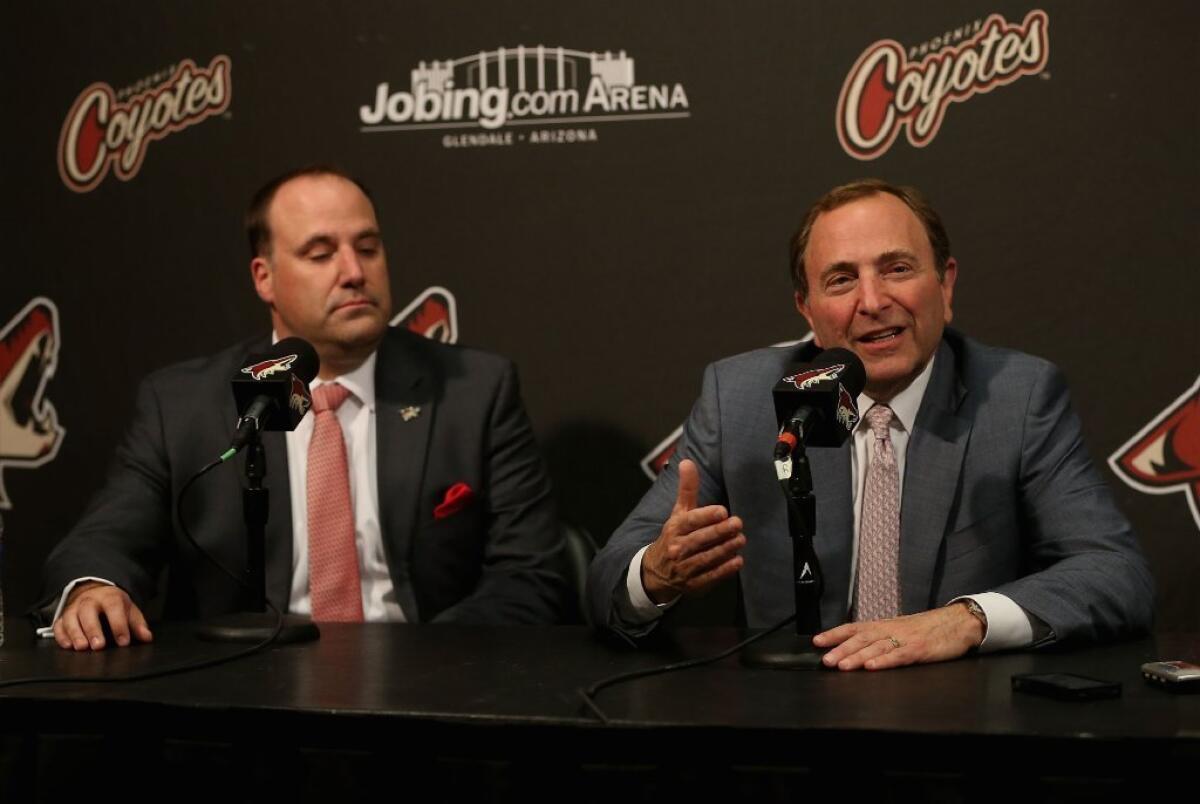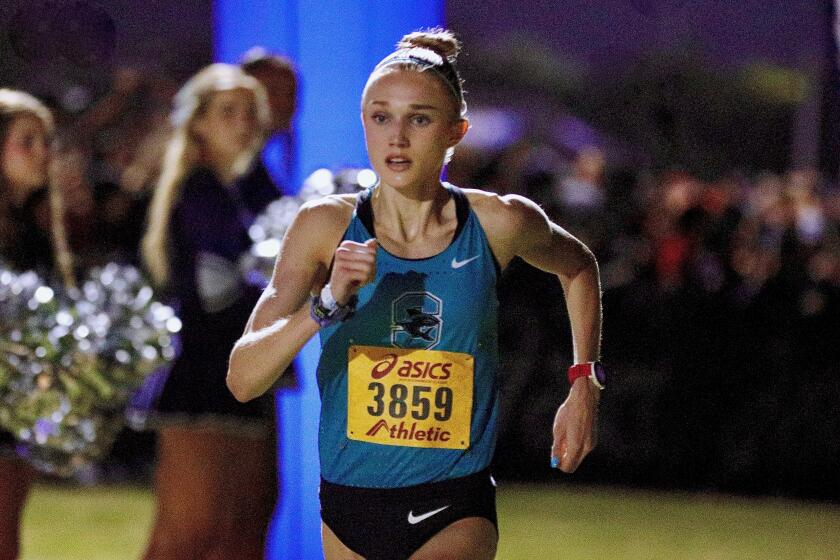Phoenix Coyotes’ new owner envisions team blooming in the desert

GLENDALE, Ariz. — Anthony LeBlanc believes the Phoenix area can be a sustainable hockey market, even though the many empty seats for the Coyotes’ game against the Kings at Jobing.com Arena on Tuesday would seem a strong contradiction.
LeBlanc is co-owner, president, chief executive and alternate governor of the Coyotes, a string of titles he assumed last summer when he and other investors banded together to purchase the franchise from the NHL for $170 million. He and fellow investor Daryl Jones had chased a deal to buy the Coyotes for four years but couldn’t quite close it; with financier George Gosbee on board the IceArizona group completed the transaction in August.
The scrappy Coyotes have done their part by playing well — they’re 8-3-2, including a 5-0-1 point streak at home — but the announced crowd of 10,542 for their 3-1 victory over the Kings was below the average over the previous five games, 12,834.
“There’s a lot more wood to chop. We know that,” LeBlanc said before the game, “but at the end of the day, we feel confident.”
LeBlanc was the vice president of global sales for RIM, the company that manufactures the BlackBerry; most of the other investors come from finance or the oil and gas industry and most are Canadian. They say they’re focusing on the business operations and leaving the hockey to General Manager Dave Maloney and Coach Dave Tippett, which is a wise decision.
Jones, who helped bring Gosbee into the picture, said the group projects the rebound of the depressed local housing market will provide a boost at the box office. “As housing rebounds it should help free up people’s wallets to spend on things like tickets,” he said.
LeBlanc said the improving economic conditions in the area and a competitive team are among the reasons he believes hockey can thrive here.
“Our view is they’ve never had, at least since the team has moved to Glendale, a situation where two key things have happened: One is stable ownership, and the other is having a good product on the ice,” LeBlanc said. “So you had eight years where the team, unfortunately, wasn’t playing very well. And if you look at the majority of markets, maybe with the exception of Toronto and Montreal, you’re going to take a hit at the box office if that is the case.
“And then you bring in Don Maloney and you bring in Dave Tippett and they do a great job of turning the franchise around and that coincides with the uncertainty over the ownership situation. So if you look at what happened over the last four years, though, it is pretty amazing to see that obviously the worst year for any of the metrics we would look at — attendance, sponsorship, suite sales — the worst was four years ago. But to see the growth over the last four years, while that uncertainty overhang was still in place, really shows you what the potential was.”
LeBlanc said the team’s attendance average last season of 13,924 “is not the Rangers or the Red Wings but for this market, that’s respectable. But the reality is it is a good market. I’ve always said that if it isn’t argued that San Jose, Dallas and Carolina are good hockey markets, I think it’s very difficult to argue that this cannot be a good hockey market.
“First, let’s look at the size of the region. It’s a very large city. But we also have such a large number of transient people and transplants, predominantly from northern states and Canada, so we think that is another important factor as to why this is going to be successful.”
The Coyotes’ corporate and suite revenues took big hits during the years their future in Arizona was uncertain and it appeared they might move to Winnipeg, Seattle or Quebec, but LeBlanc said revenues from those sources are growing rapidly. Riding the wave of the NHL’s growth will also put money in the Coyotes’ coffers, or so they expect.
“It’s important to point out that when we were putting this together we weren’t saying, ‘We’re just buying the Phoenix Coyotes.’ We’re buying one-thirtieth of the NHL, and that is a growing enterprise,” LeBlanc said. “People can say what they want about Commissioner [Gary] Bettman but he’s done a very good job of growing the business. COO [John] Collins has come out and said league revenues are going to go up by a billion over the next three years. That’s exciting.”
The group has an out clause in its 15-year arena lease that could be activated if the Coyotes’ losses hit or exceed $50 million after five years. That provision triggered more concerns about the franchise’s long-term future in Arizona, but Jones said the group doesn’t anticipate invoking the clause.
“We’ve never even contemplated an alternative plan,” he said. “I think our focus is really on Phoenix and making it successful here.”
ALSO:
Kings fall to Phoenix Coyotes, 3-1
World Cup fans face delay in allocation of tickets
Ducks’ Teemu Selanne injured in 3-2 win over Philadelphia Flyers
More to Read
Go beyond the scoreboard
Get the latest on L.A.'s teams in the daily Sports Report newsletter.
You may occasionally receive promotional content from the Los Angeles Times.










